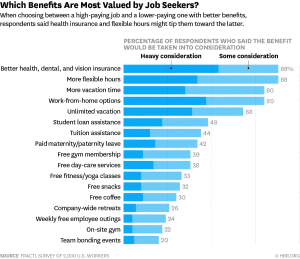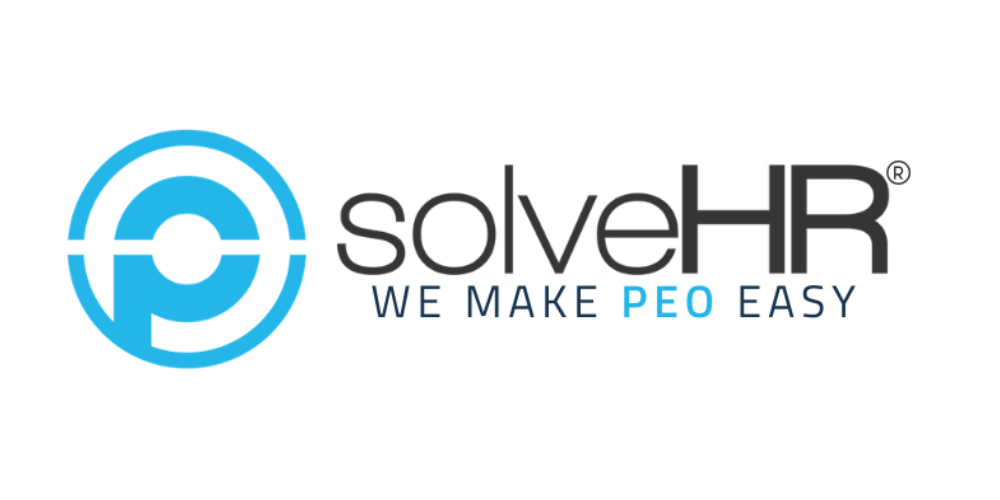- 04/20/2021
- Posted by: SolveHR-IT
- Categories: Culture & Retention, Recruitment & Selection

The job marketplace can be an incredibly competitive space as companies duke it out to offer better benefits to attract top–tier talent. It seems as if businesses these days must continue to go back and forth one–upping each other in a pursuit to retain their current talent and attract new talent away from their competitors, but what exactly do employees want out of their jobs anyway?
According to Glassdoor’s 2015 Employment Confidence Survey, about 60% of people report that benefits and perks are a major factor in considering whether to accept a job offer. Additionally, the survey found that 80% of employees would choose additional benefits over a pay raise. Glassdoor’s survey would indicate that the benefits that you offer to your employees can make or break your recruitment strategy.
What benefits employees want out of their jobs is what we’ll be thinking about this week as it can be a useful question to inform your recruitment strategy and what benefits you offer to your employees. We’ll be looking at what the wants and needs of employees are currently and begin to think about how those could change over the next decade.
How Have Employees’ Wants Changed Over Time
Employee benefits and compensation were unheard of until the early 20th century and were introduced as a way for employers to begin meeting the needs of their workforce. Government enacted health, retirement programs, insurance policies, pension, profit-sharing, and bonus plans are just some of the benefits that the 20th century brought to the business world.
The definition of what qualifies as great benefits shifts between generations of workers, but according to an SHRM survey that looked at benefits trends from 1996 to 2016, the number of benefits offerings have increased over the past 20 years, but the coverage of core benefits like health care, retirement planning, and employee assistance programs has changed very little since 1996.
Even so, today’s packages that are offered to employees are more robust and diversified than their predecessors. Employers now are beginning to offer new types of benefits to attract a new generation of workers, such as tuition reimbursement, work–from–home options, unlimited vacation days, more parental leave, and a slew of other benefits.
While the core benefits of retirement, healthcare, and employee assistance programs haven’t changed, these new types of benefits are meant to cater to a younger generation of workers that prioritize a work-life balance.
What Benefits are Employees Looking for in Their Job?
So what benefits are potential employees looking for when looking for a job? A study conducted by Fractl surveyed 2,000 employees across various industries to understand this question. They gave the participants of the survey seven-teen benefits and asked them how heavily they would weigh each benefit when deciding between a high-paying job and a lower-paying job with more benefits.

The results of the study found some obvious answers, but some surprising results could be offered to employees at a cheap cost to employers. The top five answers that were reported were:
- Better health, dental, and vision insurance– 88% of respondents saying some or heavy consideration
- More flexible hours– 88% of respondents saying some or heavy consideration
- More vacation time– 80% of respondents saying some or heavy consideration
- Work-from-home options– 80% of respondents saying some or heavy consideration
- Unlimited Vacation– 68% of respondents saying some or heavy consideration
Health insurance sits at the top but is also the most expensive benefit to offer with an average cost of $6,435 per employee. The next most-valued benefits are the ones that offer flexibility and improve work-life balance. These benefits are important to employees and can give a competitive edge to lower-paying jobs. Parents especially enjoy the freedom of being able to spend more time with their children, increasing their productivity.
Flexible hours and work-from-home options are excellent choices that are affordable for companies wanting to offer appealing benefits but can’t afford the cost of expensive benefits packages.
More vacation time and unlimited vacation was also a popular benefit that employees stated they wanted. At first glance, an unlimited vacation plan may seem like it would be subject to abuse by employees, but U.S. workers are notorious for not using vacation days. An article from CNBC states that U.S. workers forfeit more than 200 million vacation days annually, totaling more than $66.4 billion in lost benefits each year.
Unlimited vacation time can help save money in the long run by not having to pay out any unused vacation days to employees leaving the company, saving more than $1,898 per employee according to research from the U.S. Travel Association. It also demonstrates trust in the employees by making them responsible for ensuring that their work is done regardless of the time they take away from the office.
Non-Traditional Benefits
You may have noticed that there are a few other perks lower on that list that employees considered. Some of these are what you could classify as non-traditional benefits, or benefits that go beyond the traditional health care, PTO, and retirement packages that companies normally offer.
Work from home options and unlimited vacation time would fall under this category too, but there is a slew of other options that businesses can also offer that can benefit potential employees such as:
- Tuition reimbursement
- Catered lunches
- Free Day-Care Services
- Free Snacks and Coffee
- Pet Benefits
- On-Site Gym
Of course, you don’t have to offer all of these benefits to stay competitive in the employee marketplace but offering a different combination of traditional and non-traditional benefits can make working at your businesses much more attractive for potential employees.
When developing your benefits package, you should first think about the kind of workforce you want as not all benefits and perks will attract all employees.
Need help deciding what benefits are best for your business? SolveHR takes the guesswork out of choosing benefits with our experts who are trained to find a solution tailored to your business’s needs. Contact us to find out how our transactional HR services can simplify the administration work that goes into managing benefits so you can focus on what matters—growing your business!

